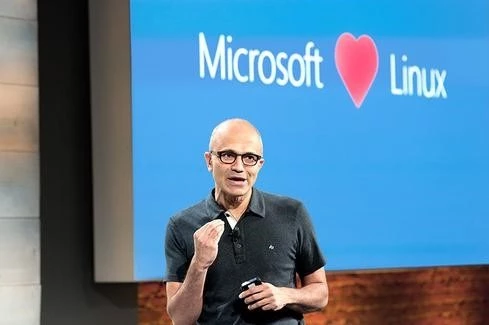But will they encourage cross platform development by Windows developers, or will Windows evolve into a premium Linux port....dragging them along?
https://www.extremetech.com/computin...nux-foundation
https://www.extremetech.com/computin...nux-foundation
Hell freezes over as Microsoft joins the Linux Foundation
Fifteen years ago, Steve Ballmer memorably declared Linux was a cancer. Now, Microsoft announced it was joining the Linux Foundation. Thats not a completely unprecedented move, given that Microsoft has been getting steadily chummier with open source software over the last few years. Theres a Linux Bash shell integrated into Windows 10s Anniversary Update, after all. But joining the organization responsible for maintaining Linux and for funding various open source projects? Thats a true 180 from where the company used to be.
Microsoft also launched a beta of SQL Server for Linux, while Google just joined the .NET Foundation, PC World reports. Microsoft is releasing a version of Visual Studio for the Mac, although this is based on Xamarin, not a straight port of Visual Studio. Samsung has a preview version of Visual Studio for Tizen, which will allow .NET applications to be built for Samsungs non-Android hardware. If you wanted to blow someones mind from 2010, try telling them that Microsoft will help build Linux, Samsung wants VS support for Tizen, and Google has added .NET after spending so much time and effort investing in Java.
Microsofts move to embrace Linux is undoubtedly driven by changing macroeconomic conditions around the PC business. For decades, as the dominant server and consumer operating system, Microsoft had very little reason to play nice with others or work to emphasize interoperability. The explosion of the mobile market and the companys complete failure to penetrate it has left it little option but to seek other types of collaboration and cross-platform support. Building products that work seamlessly across both Linux and Windows is one way for Redmond to ensure it remains relevant across the data center and server markets.
Microsoft is hitting all the right notes in terms of aligning its developer business with an ecosystem much broader than Windows, IDC Program Director Al Hilwa told PC World. Joining the Linux Foundation is a natural progression of this strategy and one that might still generate a double take if it wasnt for all the actions the company has already taken in terms of supporting Linux in Azure and with SQL Server.
>
Fifteen years ago, Steve Ballmer memorably declared Linux was a cancer. Now, Microsoft announced it was joining the Linux Foundation. Thats not a completely unprecedented move, given that Microsoft has been getting steadily chummier with open source software over the last few years. Theres a Linux Bash shell integrated into Windows 10s Anniversary Update, after all. But joining the organization responsible for maintaining Linux and for funding various open source projects? Thats a true 180 from where the company used to be.
Microsoft also launched a beta of SQL Server for Linux, while Google just joined the .NET Foundation, PC World reports. Microsoft is releasing a version of Visual Studio for the Mac, although this is based on Xamarin, not a straight port of Visual Studio. Samsung has a preview version of Visual Studio for Tizen, which will allow .NET applications to be built for Samsungs non-Android hardware. If you wanted to blow someones mind from 2010, try telling them that Microsoft will help build Linux, Samsung wants VS support for Tizen, and Google has added .NET after spending so much time and effort investing in Java.
Microsofts move to embrace Linux is undoubtedly driven by changing macroeconomic conditions around the PC business. For decades, as the dominant server and consumer operating system, Microsoft had very little reason to play nice with others or work to emphasize interoperability. The explosion of the mobile market and the companys complete failure to penetrate it has left it little option but to seek other types of collaboration and cross-platform support. Building products that work seamlessly across both Linux and Windows is one way for Redmond to ensure it remains relevant across the data center and server markets.
Microsoft is hitting all the right notes in terms of aligning its developer business with an ecosystem much broader than Windows, IDC Program Director Al Hilwa told PC World. Joining the Linux Foundation is a natural progression of this strategy and one that might still generate a double take if it wasnt for all the actions the company has already taken in terms of supporting Linux in Azure and with SQL Server.
>



Comment